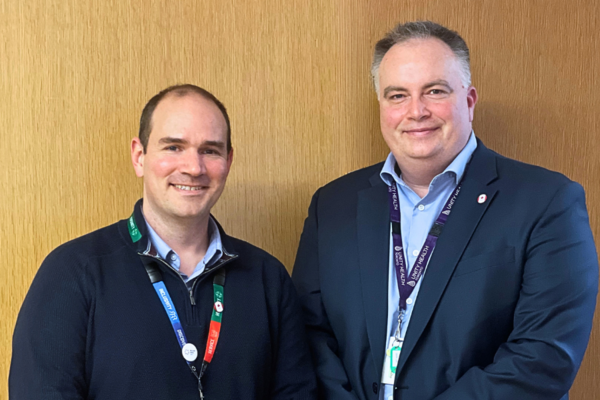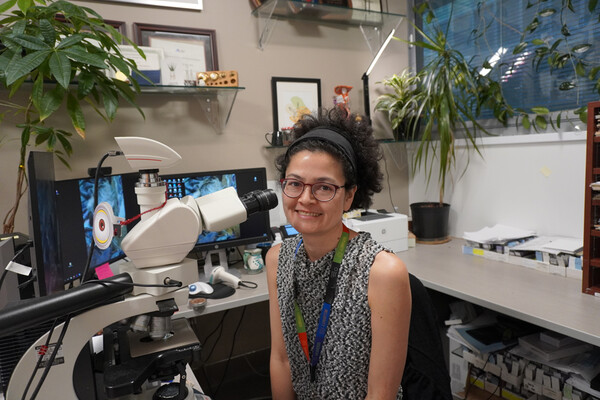Leading the charge: Microbiology's evolution and COVID-19

“A lot of people are burned out from the COVID-19 response so it’s sometimes hard to recognize how far we've gone in that short period of time and what that means. I think there will be huge changes in the way we deliver microbiology locally and internationally,” says Dr. Vanessa G. Allen.
Dr. Allen is a Medical Microbiologist and Infectious Diseases Physician at Sinai Health / University Health Network and has recently been promoted to Associate Professor in the Department of Laboratory Medicine and Pathobiology at the University of Toronto. She also serves as Medical Director of the Provincial COVID-19 Diagnostic Network at Ontario Health. Her career and work span public health, clinical infectious diseases, laboratory diagnostics and research, so she has a wide perspective on the impact of microbiology.
While completing the first year of her internal medicine residency in Toronto, SARS arrived in Canada. “A huge amount of mobilization and leadership came out of that, right when I was deciding what discipline I wanted to go into”. This inspired her to become an Infectious Disease clinician, so she completed further residencies in medical microbiology and infectious disease at U of T.
“I’m fascinated by the different perspectives in working with infectious diseases and microbiology: at a system level, the clinical level and at the organism level. I love working in a field where I can look at the disease, treat the patient and then bridge to population care”.
Her role at Public Health Ontario (PHO) took an interesting career trajectory. Very soon after completing training, she was asked to lead as Medical Director (later renamed as Chief of Microbiology and Laboratory Science). “It was intriguing to be able to look at the segregated way Ontario works and figure out tools to work on these various levels, from diagnostics to public health. Going into a role like that when I was so junior was a real privilege and a huge learning curve”.
When COVID-19 hit in 2020, they felt better prepared at PHO. “The whole lab was built to respond to this kind of situation - it was why I went into the field, why we were all there. We had invested a lot of effort in improving our response capacity. We had worked for years to introduce genomics and had created a pathogen response unit for emerging infections. The pandemic was a test of what we had spent the last 10 years building”.
In the early days, Allen believed the system worked well. They developed and refined a test extremely quickly and tested the first sample for this novel pathogen on January 10, 2020 - two weeks after there was notification of the outbreak in Wuhan - and diagnosed the first case in Canada on January 25, 2020. PHO could do 500 tests, which was a lot at that time.
“However, what we had was nowhere near the scale of testing a population of 15 million in a pandemic needed, particularly in the early days without a vaccine. Expert colleagues across microbiology labs throughout the province all worked together to rapidly implement testing, distribute samples across labs to get them tested quickly, and share limited supplies. The Provincial COVID-19 Diagnostic Network was born out of this immensely collaborative effort. It formalized this capacity with common infrastructure enabling us to share data and specimens in a timely and coordinated way, optimize access to testing for underserved communities, and build genomics capacity for early detection of variants”, she explains.
The future of microbiology
What gets Allen really excited about is the “tremendous opportunities” in the future of microbiology. We asked her what she thought the key areas were.
The data revolution
“From my perspective, lab tests create data, so we need to start thinking about microbiology as a fundamental contributor to data science. It takes extensive expertise to produce high quality microbiology results – that is a huge focus in the field. We also need to figure out what skill sets junior trainees entering the field need - how do they develop data literacy skills to be able to answer interesting questions? How do we manipulate all this data and analyse it in a novel way? We need to ensure high quality data production and that the microbiology expertise continues so data is used properly”.
The role of genomics
“In my experience, often the clinical, individual management of a patient is separated from public health management of infectious diseases in Ontario. They’re funded separately as two systems. However, almost all infections have both clinical and public health implications and working to both diagnose and treat those affected and prevent these infections in the future are complementary functions that can be better integrated.
Genomics helps us bridge this gap. If you have flu, it can by typed so we essentially get a fingerprint of your flu strain. This can be used for your management as a patient but can also inform what's going on in the community. We can then make decisions that will help one patient, but also prevent other infections in the wider population.
This idea of bringing the two systems together is really interesting, but it also means changing the skills of the workforce and changing expectations of what those results are. We don't know exactly how genomics will change how we deliver microbiology results, it’s still ambiguous but exciting.”
The expansion of Point-of-Care-Testing
“Point-of-Care-Testing enabled the democratization of testing during COVID - and led to a much higher level of enthusiasm about testing than I have ever seen before. I think the barriers to testing will be vastly reduced as a result of this emphasis on more widely accessible testing platforms.
Questions include; how do we support that kind of testing program for individuals in a publicly funded healthcare system? How do you get the data to public health so it can influence policy decisions when tests are used at home and results are not recorded? How do we manage Quality Assurance?
We have to explore how we can improve the technologies and the systems, as well as user education: for example, many users may not be aware of both the strengths and the limitations of different point-of-care tests. A negative test result from a rapid antigen COVID test does not always rule out disease and many people may not know that”.
The present
Allen has now left PHO for a change in focus and joined the Sinai Health / University Health Network laboratories, working with colleagues Dr. Tony Mazzulli and Dr. Susan Poutanen. She is now involved in resident teaching and building a clinical and research program based on maternal infections.
“Pregnant women are particularly susceptible to infections due to the immune suppression of the pregnancy. We’re studying common infections like food-borne and sexually transmitted diseases such as Listeria monocytogenes and syphilis, as well as other common viral and bacterial infections in pregnancy. A second focus is the mitigation and treatment of multidrug resistant organisms in pregnancy. Lastly, we are interested in seeing how we can combat emerging infections and support pregnant women and their fetuses should new threats arise”.
She is enjoying working at Sinai Health and University Health Network as a Medical Microbiologist and Infectious Diseases Physician, focusing on the clinical aspects and linking this to system capacity and expertise – something that is “consistent with how my brain works. I feel like I’m running my career backwards in a way, but I’m having a ball!"
Find out more about microbiology
Medical Microbiology training program for MDs
Postdoctoral training program in Clinical Microbiology for PhDs
Dr. Vanessa Allen's faculty profile
U of T Scientists discover a century of safe and effective use of Phage Therapy
Mpox microbiology: the vital understanding of a virus
Microbiology labs power pandemic response
Microbiologists: the unsung heroes of the pandemic
More on promotions in LMP
Information about senior promotions for LMP faculty
Promotions 2023: Q&A with Vanessa Allen
This story showcases the following pillars of the LMP strategic plan: Impactful Research (pillar 3), Disruptive Innovation (pillar 4) and Agile Education (pillar 5).



